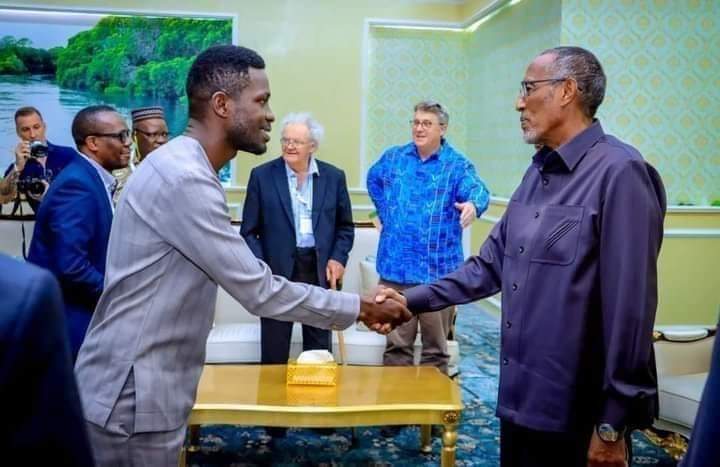Former presidential candidate, Robert Kyagulanyi Ssentamu alias Bobi Wine has heaped praise on Somaliland and its leadership for upholding democratic governance.
The National Unity Platform (NUP) made the remarks after participating in the two-day international conference on peace and state-building which ended today Sunday in Hargeisa, Somaliland’s Capital.
The conference organized by the Brenthurst Foundation led by Dr Greg Mills, brought together scholars, politicians, researchers, journalists and others from at least 17 countries to exchange views on contributory factors that affect security and state-building in Africa.
Also read: https://plusnews.ug/bobi-wine-in-somaliland-for-african-security-dialogue/
“Today, we came to the close of the two-day conference on Peace and Security in Africa, held in Hargeisa, the capital of the Republic of Somaliland. Great pleasure to meet and learn from His Excellency Muse Bihi (Somaliland President) regarding his country’s journey to statehood and nation building,” writes Bobi on Twitter.
Somaliland’s 11 years of war
Somaliland, arguably the most democratic and politically stable nation, Somaliland was the 12th African nation to become independent from the colonial with an official Royal Proclamation of her Majesty Queen Elizabeth II.
The country became became independent before 42 African countries.
Soon after the Somaliland independence from the British rule, 34 countries recognized it as an independent state, including members of the Security Council, but after only 5 days, the people of Somaliland decided to voluntarily unite with the next door, Somalia when they received independence from Italy to create the Somali Republic.
The dream was to have a greater Somali Republic in the Horn of Africa, waiting for other Somali inhabited territories including Djibouti, North Eastern Province of Kenya and Somali region of Ethiopia to join the Union and that’s the reason the Somalia Flag still have the White star at the middle with Five edges, each edge represents the 5 territories that Somali people permanently inhabit.
Unfortunately, the first marriage between the first two Somali states failed. Although it was never legal and there was no union Act ratified by joint parliament, the union was entirely turbulent and unsatisfactory.
After 31 years of difficulties, injustice, inequalities, and prejudice, that union ended horribly with 11 years of War against Somalia’s military regime which claimed the lives of a quarter of a million of the Somaliland people after civilians were shelled and cities were bombed and leveled to the ground by the military.
Victory at last and road to democratic rule
In 1991, Somalilanders defeated and destroyed the military deployed to their land by the military government, declaring their withdrawal from the failed union they had been part of, for more than 3 decades.
This is where the miraculous and phenomenal African success story starts, and the most democratic country in east Africa begins its extraordinary journey.
Prior to the official opening of the Conference, Bobi Wine and other participants toured Hargeisa City and visited Berbera port, Berbera International Airport and Wajaale, getting a glimpse of the rapid infrastructural developments currently taking place in Somaliland.
“Great to see that the country which was almost entirely destroyed by war has since made great progress in terms of economic development,” says Bobi Wine.
Somaliland has had series of democratic election, since 1991, which international observers termed as Free, fair and credible elections.
Five different presidents have been elected since 1991 where sometimes an incumbent president lost the race and transferred power peacefully.
Another historic electoral incident happened in 2003, when a candidate won the presidential election with a margin of only 80 votes against his contender, which is actually the least margin in the history of global democracy.
“Very interesting to see that since 1991, this country has had five governments, each of them elected democratically on a peaceful basis,” Bobi Wine notes.
During the conference, Bobi Wine a sworn critic of the Ugandan leader, Yoweri Museveni, wondered how the country’s liberation movement, the “SNM was able to hand over power to civilian rule, something that has eluded most African countries.”
President Muse Bihi said SNM prioritized reconciliation and peace building by tasking the traditional elders with the responsibility to heal the rift among the Somaliland communities who were on the opposite side of the struggle against Siyad Barre regime.
“This strategy was pursued with vigor and established the foundation upon which the peace and stability of Somaliland stands on today,” Muse explained.
He said Somaliland’s reconciliation and peace building process was largely homegrown, locally financed and organized as a result of initiatives taken by a diverse range of actors with broad support.
Meanwhile, despite Somaliland having geographical and political boundaries, a President, issues visa to incoming visitors through its consulates, own flag, own number plates to motor vehicles and all other trappings of countryhood, the country’s remains unrecognized as an independent nation by the international community.
Also read: https://plusnews.ug/somaliland-unrecognized-nation-with-all-trappings-of-countryhood/

